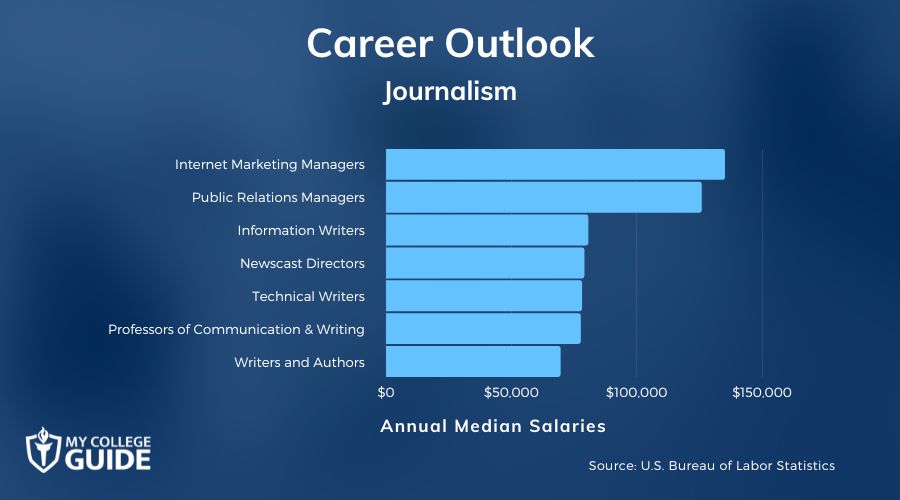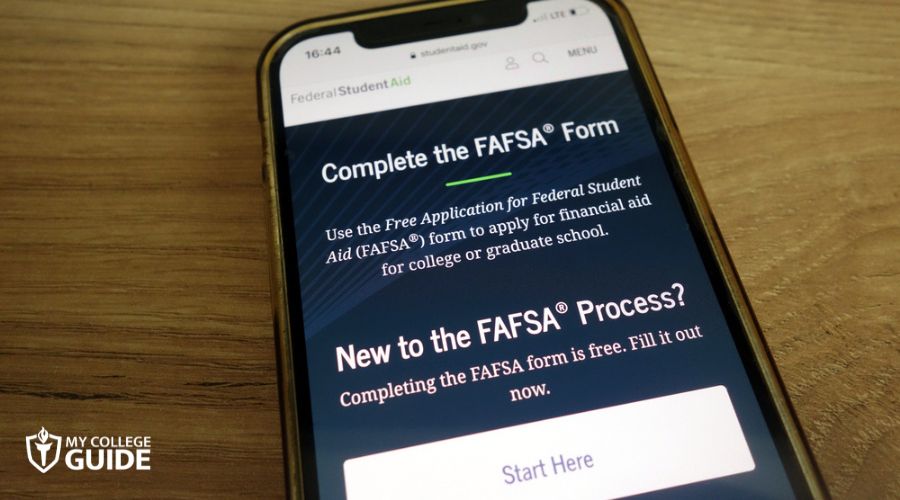If you have a passion for the written word and enjoy working within the field of communication, consider researching various online journalism degrees that can help you learn the essential skills to build a lucrative writing career.

Editorial Listing ShortCode:
Whether you want to work in business marketing, content writing, or as an editor in a publication house, your online journalism degree will open the door to a number of exciting job opportunities.
Online Bachelor’s in Journalism Degrees

An online bachelor’s degree program in Journalism will provide you with a solid foundation of communication skills across a number of different platforms.
With advancements in technology, it is essential that you understand the unique challenges and benefits to becoming a journalist in the technologically advanced world. In addition to your core educational classes, you will take journalism-specific courses that may include the following:
- Digital and Media Literacy
- Multimedia News Writing and Editing
- Journalism Ethics and Law
- Newsgathering and Reporting
- Research and Analysis
After successful graduation from your online Journalism degree program, you will have learned the technical and research skills needed to succeed in a number of professional careers, including editing, feature writing, and marketing. In many degree programs, you will also be creating a professional electronic portfolio of your work as a requirement for graduation.
Editorial Listing ShortCode:
By choosing an online degree program for your IT career, you also award yourself the flexibility to complete your degree program at your own pace and within the comfort of your own home or anywhere with an Internet connection. This allows you to keep up with daily responsibilities like a job or caretaker.
Online programs can be completed online or through a hybrid of online and on-campus classes. You can choose whichever format best fits your situation and learning preferences.
Common Online Bachelors in Journalism Concentrations

Journalism covers numerous forms of media and topics. Many programs allow students to specialize in a particular area, such as:
- Broadcast Journalism: This specialization focuses on creating and distributing news stories through radio and television. Students learn about the evolution of mass media, news ethics, and strategies to create engaging newscasts.
- Investigative Journalism: Professionals in this subfield conduct extensive research on serious issues, such as political scandals and corporate safety violations. Courses address topics like archival research, data journalism, and interviewing sources.
- Multimedia Journalism: This concentration teaches students how to use various modes and technologies to produce interactive news stories. Students study animation, audio engineering, film production, social media, and other subjects.
- Social Media and Public Engagement: Learn how to use design thinking and visual rhetoric to tell compelling narratives on social media. Classes cover topics like digital marketing, new media, online journalism, and personal reputation management.
- Sports Journalism: This specialization centers on stories about athletes and sports competitions. The curriculum may include communication law, multimedia reporting, and sports feature writing.
A concentration lets you deepen your knowledge of journalism and work closely with faculty experts in your preferred area.
Journalism Careers and Salaries

Effectively communicating through the written word is essential across nearly every professional industry. This gives students with an online degree in Journalism the opportunity to work pursue a number of exciting professions.
In the table below, we have put together a short list of popular journalism careers and their median annual salaries according to data provided by the U.S. Bureau of Labor Statistics (BLS):
| Careers | Annual Median Salaries |
| Internet Marketing Managers | $135,030 |
| Public Relations Managers | $125,780 |
| Information Writers | $80,560 |
| Newscast Directors | $79,000 |
| Technical Writers | $78,060 |
| Professors of Communication and Writing | $77,560 |
| Writers and Authors | $69,510 |
| Scientific Writers | $65,210 |
| Market Research Analysts | $63,920 |
| Editors | $63,350 |
All of the jobs listed above offer an annual wage that is above the national average across all occupations. While you may more or less than the salaries listed, having extensive experience within your chosen specialty can help you move up to higher-paying positions.
Journalism is a broad field, and those who have graduated with this degree can find work across a variety of industries. According to data from the BLS, those who work as news analysts, reporters, and journalists are projected to decline 9% over the next 10 years. Declining advertising revenue in radio, newspapers, and television will negatively affect the employment growth for these occupations.
Editorial Listing ShortCode:
View our list of the top 40 Journalism careers to compare jobs and salaries in this field.
Journalism Bachelor’s Curriculum & Courses

Online journalism schools have broad curricula that teach core skills like communication, investigative reporting, and research. You may complete courses similar to these:
- Broadcast Journalism: Learn how to use audio, graphic, and visual tools to create news stories for broadcast and electronic media.
- Data-Driven Journalism: Examine the history of computer-assisted news reporting and learn how to tell stories with data analytics.
- Digital Storytelling: This course introduces students to digital methods and tools for creating interactive news reports.
- Feature Article Writing: Develop your news reporting skills as you create short- and long-form feature articles for magazines, newspapers, websites, and other media.
- Introduction to Journalism: You’ll study basic skills used in journalistic writing, the ethics of reporting, and news literacy.
- Investigative Journalism: This class teaches students how to analyze data, interview subjects, and write long-form news stories centering on public interest topics.
- Journalism Ethics: Study professional standards that guide journalism and learn how to make ethical choices in your career.
- Opinion Writing: You’ll analyze and write opinion pieces like blogs, editorials, and social commentary.
- News Reporting: You’ll explore fundamental methods and skills used to create news reports, such as identifying newsworthy stories and writing in Associated Press style.
- Writing and Editing for Convergent Media: This class covers skills and tools to develop and edit digital news for multiple media platforms.
Additionally, many bachelor’s in journalism degrees online require students to participate in internships and create digital portfolios.
How to Choose an Online Bachelor of Journalism Program

Receiving a quality education involves a number of different factors. In the information below, we go over a few key areas that are essential to research before choosing an online Journalism program that is right for you.
- Accreditation: Accreditation is an essential aspect of a reputable online journalism degree program. Check to see if your chosen school is accredited.
- Student-to-Faculty Ratio: Large classes can overwhelm both the students and the professors, and it is best to avoid schools that do not focus on keeping a low student-to-faculty ratio. Even in the online setting, small class sizes are essential to experience the personalized support and instruction that you need to reach your greatest potential in the field of journalism.
- Academic Advising and Student Services: Support from your school goes beyond a quality education and skilled faculty. Throughout the course of your degree program, you will likely find that you need the additional support offered by academic advising and other student services.
- Cost: The cost of each program is also an important factor. Compare various programs to see which one fits your budget.
- Degrees Offered: Be sure to check with each school you are considering to ensure they offer your chosen degree program. Also, compare the various programs’ coursework to ensure the coursework fits with your desired career goals.
If you have a knack for communication and love working with the English language, then a degree in Journalism is a great start to beginning a rewarding career! From writing and editing to working within the corporate setting, a journalism degree opens the door to lucrative, professional occupations that allow you to use your innate talents.
Journalism Major Admissions Requirements

Online journalism schools typically require applicants to submit documents that demonstrate their academic abilities and character, such as:
- Two to three letters of recommendation from administrators, coaches, or teachers
- ACT or SAT scores (only some programs require them)
- Official transcripts from high school and all post-secondary institutions
- Personal statement discussing the applicant’s interest in journalism and professional goals
Additionally, some programs require applicants to submit portfolios that showcase their communication and multimedia skills.
Online Journalism Degrees Accreditation

An accredited college is one that has undergone a voluntary review process by a recognized accrediting agency. This process examines the educational offerings of the school to ensure that the curriculums and programs offered are high-quality.
Editorial Listing ShortCode:
By choosing to enroll at an accredited university you can avoid falling into the trap of “degree mill” schools that will not be recognized once you enter the workforce. A couple of the accrediting agencies that are recognized by the U.S. Department of Education for the field of Journalism include:
- Accrediting Council on Education in Journalism and Mass Communication
- Regional accrediting agencies
If you are wondering whether your Journalism degree program is professionally accredited, take a look at the U.S. Department of Education’s website for a detailed list of recognized agencies nationwide.
Financial Aid and Scholarships

Many college students qualify for financial aid that can reduce the cost of a journalism bachelor degree online. Financial assistance may cover tuition, books, distance learning fees, and other expenses.
Associations for media professionals frequently offer grants and scholarships for journalism majors. Some of these financial opportunities target students interested in specific areas of journalism, like print journalism or science writing. Other organizations assess applicants based on financial need or merit. You may need to write an application essay or submit a portfolio of news articles for consideration.
The federal government also provides financial aid to eligible students enrolled in accredited online journalism skills. You may qualify for federal or state grants, student loans, and work-study programs. You can fill out the Free Application for Federal Student Aid (FAFSA) to determine your eligibility.
Journalism Professional Organizations

Professional organizations host networking events and provide professional development opportunities for journalists and journalism majors. Prominent journalism associations include:
- Investigative Reporters and Editors (IRE): This national association organizes conferences, workshops, and other training programs for investigative journalists.
- Online News Association (ONE): This nonprofit organization educates digital journalists about emerging technology, hosts an annual conference and organizes local meet-ups for members.
- Society of Professional Journalists (SPJ): This coalition advocates for the freedom of the press and educates members about best practices in journalism.
Many professional journalism organizations have discounted memberships and scholarships for students.
Should I Get an Online Journalism Bachelor’s Degree?

Earning a degree in journalism online is a great opportunity for working adults or for those that are juggling a busy schedule in their home life.
With the advancement of technology, many schools are now offering these flexible degrees online that use the same curriculum and standards as traditional degrees. There are several advantages to working towards your Journalism degree online, including:
- Flexible options for scheduling classes and attending in-person residencies
- Possibility of lower tuition costs than on-campus degree programs
- Ability to work directly with technological tools that will enhance your writing skills
- Access to educational platforms that allow you to communicate with journalism experts, instructors, and classmates from across the country
While the flexibility of an online degree program allows you to log on to classes anytime and anywhere, it is important to understand that this does not mean the classes are less rigorous than traditional courses.
What is a Journalism Degree?

A journalism degree is designed to teach students how to research, write, and edit news stories. Students create engaging and informative reports for a broad range of audiences and in various forms of media. For example, they may develop content for blogs, newspapers, and social media platforms.
Editorial Listing ShortCode:
Online degrees in journalism cover numerous skills and tools professionals use in the discipline. Students can study broadcast journalism, data visualization, interview strategies, photography, public engagement, and video editing. They also learn about ethical standards and laws that impact journalism.
Is Journalism a Good Major to Take?

Yes, journalism is a good major to take for many undergraduate students. This degree focuses on analyzing, developing, and editing content for the media.
Students learn how to tell accurate and informative stories that captivate audiences. An online journalism degree teaches students various interpersonal skills. For example, journalism majors can develop communication abilities and empathy as they craft news reports and interview subjects.
Graduates who earn online degrees in journalism follow many career paths. They often become journalists, news analysts, and reporters. According to the Bureau of Labor Statistics, these professionals earn a median salary of $48,370.
What Can I Do With a Journalism Degree?

Earning a journalism bachelor degree online can unlock many career opportunities. Graduates frequently work as journalists and news reporters for magazines, newspapers, radio shows, and other media outlets. They research and write stories about significant events and issues.
Journalism majors also secure jobs in education, healthcare, marketing, and other industries. For example, some graduates get hired as copywriters for corporations, while others work as product managers for marketing firms.
Additionally, graduates can pursue careers as freelance journalists. These experts pitch and write stories for companies and news outlets. A freelance journalism career may offer more flexibility than a salaried job.
How Long Does It Take to Get a Bachelor’s Degree in Journalism Online?

Online schools in journalism have varying curricula and graduation requirements, which can affect their timelines. Most programs require bachelor’s students to complete at least 120 credit hours. Generally, it takes full-time students four years to graduate from schools that have traditional 16-week semesters.
Some programs offer courses year-round or in accelerated 8-week semesters. Journalism majors who stay enrolled continuously may complete their degrees in 3 years. Part-time students may need to take classes for 5 or 6 years before graduation. A senior thesis or internship could also extend the time required to finish a degree.
What Journalism Degree Jobs Can I Get?

Current professionals with bachelor’s in journalism degrees online work in many roles and sectors. Graduates who become journalists and news reporters specialize in many areas. Some people cover local news for broadcast radio, print newspapers, and television stations. Other journalists focus on digital storytelling for social media and websites.
Journalism majors also pursue careers as public relations specialists. They develop communication strategies, plan social media campaigns, and write press releases. Also, current professionals often work for marketing firms. They research consumer behavior and market products and services. Potential job titles for these experts include lead generation specialist and SEO strategist.
What’s the Difference Between a BA in Communications vs. Journalism Online Degree?
Communications and journalism degrees both teach students how to convey information to audiences, but they have several differences:
| BA in Communications | BA in Journalism |
|
|
If you want to work in journalism, a BA in journalism can help you develop career-specific expertise and skills.
Is a Degree in Journalism Worth It?

Yes, a degree in journalism is worth it for many students. This degree enables students to expand their communication abilities and share informative stories with mass audiences. Students can develop expertise in many areas of journalism, like investigative reporting and sports journalism.
Editorial Listing ShortCode:
Students who enjoy advocacy and research may find a journalism degree particularly fulfilling. For example, journalists can help whistleblowers expose government misdeeds and disseminate information about social issues. The Bureau of Labor Statistics estimates that 4,900 jobs will open annually for journalists, news analysts, and reporters in the next decade.
Universities Offering Online Bachelor in Journalism Degree Programs
Methodology: The following school list is in alphabetical order. To be included, a college or university must be regionally accredited and offer degree programs online or in a hybrid format.

Colorado State University offers a BA in Journalism and Media Communication that can be completed entirely online. Courses follow a regular semester schedule, with start dates in the fall, spring, and summer. The program requires the completion of 120 credit hours, including a capstone class. Other potential courses include Media Ethics and Issues, International Mass Communication, and Media in Society.
Colorado State University is accredited by the Higher Learning Commission.

Drake University offers a BA in Journalism and Mass Communication – Digital Communication that can be earned fully online. Students need at least 60 transferable credits from an associate program for admission into this program. The curriculum for this program consists of another 64 credits of asynchronous, 6 week courses. Potential courses include Digital Media Strategies, Mass Media in a Global Society, and Magazine Staff Writing.
Drake University is accredited by the Higher Learning Commission.

Liberty University offers a BA in English and Writing with a concentration in Journalism that can be earned completely online. The program requires the completion of 120 credit hours and allows up to 75% of them to be earned from qualifying transfer credits. Courses are 8 weeks long. The degree can typically be earned in 3.5 years.
Liberty University is accredited by the Southern Association of Colleges and Schools Commission on Colleges.

Louisiana State University – Shreveport offers a BS in Mass Communication with a concentration in Journalism that can be earned fully online or on campus. The program requires the completion of 120 credit hours and can typically be finished in 4 years. All students pay the same tuition, regardless of residency.
LSU Shreveport is accredited by the Southern Association of Colleges and Schools Commission on Colleges.

Loyola University – New Orleans offers a BA in Mass Communications with a specialization in Journalism that can be completed entirely online or on campus. The program requires the completion of 120 credits and accepts up to 90 qualifying transfer credits. Courses are 8 weeks long, and there are several start dates offered throughout the year.
Loyola University New Orleans is accredited by the Southern Association of Colleges and Schools Commission on Colleges.

Ohio University offers a BS in Journalism that can be earned fully online through asynchronous courses. The courses follow a regular semester schedule, and there are start dates offered in the fall, spring, and summer. The curriculum consists of courses such as The Future of Media, Communication Law, and Precision Language for Journalism, and electives may be chosen for further customization.
Ohio University is accredited by the Higher Learning Commission.

U.S. News & World Report ranked Pennsylvania State University among the best schools in the country for online bachelor’s degrees. Penn State offers a BA in Digital Journalism and Media through its World Campus. The program requires the completion of 120 credits. Most courses are asynchronous with set due dates.
Penn State is accredited by the Middle States Commission on Higher Education.

Regent University offers a BA in Communication Studies with a specialization in Journalism that can be earned entirely online or on campus. Many courses are taught through a Christian worldview. The program requires the completion of at least 120 credit hours. Courses are 8 weeks long, and there are eight start dates offered each year.
Regent University is accredited by the Southern Association of Colleges and Schools Commission on Colleges.

Southern Illinois University offers a BS in Journalism that can be earned fully online or on campus. The program requires the completion of 120 credit hours, including a minor and one of five specializations. Options include Advertising, Photojournalism, and Sports Media. Courses follow a semester schedule and are offered in the fall, spring, and summer.
SIU is accredited by the Higher Learning Commission.

U.S. News & World Report named the University of Arkansas among the best schools in the nation for online bachelor’s degrees. U of A offers a BA in Interdisciplinary Studies with a minor in Journalism and Strategic Media that can be earned fully online. The program requires the completion of at least 120 credits and allows up to 90 qualifying transfer credits.
The U of A is accredited by the Higher Learning Commission.

U.S. News & World Report named the University of Florida as one of the best schools in the country for online bachelor’s degrees. UF offers a BS in Journalism with a focus on Sports and Media that can be earned entirely online. The program requires the completion of 120 credits. Most courses are asynchronous.
The University of Florida is accredited by the

The University of Maine – Presque Isle offers a BA in English with a concentration in Professional Communication and Journalism that can be earned fully online. The program requires the completion of 120 credit hours. This competency-based program allows students to pay a flat-rate fee per 8 week session. Students may take as many courses each session as desired.
The University of Maine at Presque Isle is accredited by the New England Commission of Higher Education.

The University of Massachusetts – Amherst offers a program in which a BA or a BS in Interdisciplinary Studies with a concentration in Journalism can be earned. The program is entirely online and designed for degree completion. Most courses are available in an accelerated, asynchronous format. On-campus course options are also available. The program allows up to 105 qualifying transfer credits.
The University of Massachusetts Amherst is accredited by the New England Commission of Higher Education.

The University of New Mexico offers a BA in Journalism and Mass Communication with a concentration in Strategic Communication through a fully online, accelerated program. UNM recommends that applicants meet general education requirements before applying. Students must complete 48 credit hours within the major. Courses are 8 weeks long.
The University of New Mexico is accredited by the Higher Learning Commission.

The University of North Dakota offers a BA in Communication with a specialization in Digital Journalism that can be earned fully online or on campus. Coursework may be completed through a traditional semester schedule or self-paced courses. The program requires the completion of 120 credit hours, including a capstone experience.
The University of North Dakota is accredited by the Higher Learning Commission of the North Central Association of Colleges and Schools.

The University of North Texas offers a BA in Journalism with a concentration in Broadcast and Digital Journalism. The program is available fully online, on campus, or in a hybrid format. The program requires the completion of 120 credit hours. Courses are 8 weeks long, and there are five start dates offered throughout the year.
The University of North Texas is accredited by the Southern Association of Colleges and Schools Commission on Colleges.

The University of Wisconsin – Superior offers a concentration in Multimedia Journalism. The program is fully online, and students earn it alongside a related major. The creation of a portfolio is a requirement of the program. Courses follow a regular semester schedule, with start dates in the fall, spring, and summer. All students pay the same tuition, regardless of residency.
UW-Superior is accredited by the Higher Learning Commission.

U.S. News & World Report named Utah State University among the best schools in the country for online bachelor’s degrees. A BS in Journalism can be earned through the school’s fully online program. Classes may be attended full-time or part-time. Courses follow a regular semester schedule, with start dates in the fall, spring, and summer.
Utah State University is accredited by the Northwest Commission on Colleges and Universities.

West Virginia University offers a BS in Journalism. The program is on campus with some online course options and requires the completion of 120 credit hours. Courses follow a semester schedule and are offered in the fall, spring, and summer. The degree can typically be earned in 4 years.
West Virginia University is accredited by the Higher Learning Commission.

Wilmington University offers a BS in Communication with a concentration in Digital Journalism. The program is fully online and requires the completion of 40 courses for a total of 120 credits. Courses are offered in accelerated sessions, with six start dates each year. A Technical Communicator Certification may also be earned through the program.
Wilmington University is accredited by the Middle States Commission on Higher Education.
Getting Your Bachelors in Journalism Degree Online

If you’re passionate about telling stories, you may consider earning a journalism bachelor degree online. Journalism majors learn to craft accurate and ethical stories informing the public about noteworthy events and problems. They create content for many forms of media, such as broadcast radio and social media.
An online journalism degree can enable you to finetune your communication and research skills. You’ll learn to develop a beat, follow leads, and interview subjects. Plus, you’ll gain ethical decision-making skills.
You can start today by researching accredited online journalism schools to find the right program.
